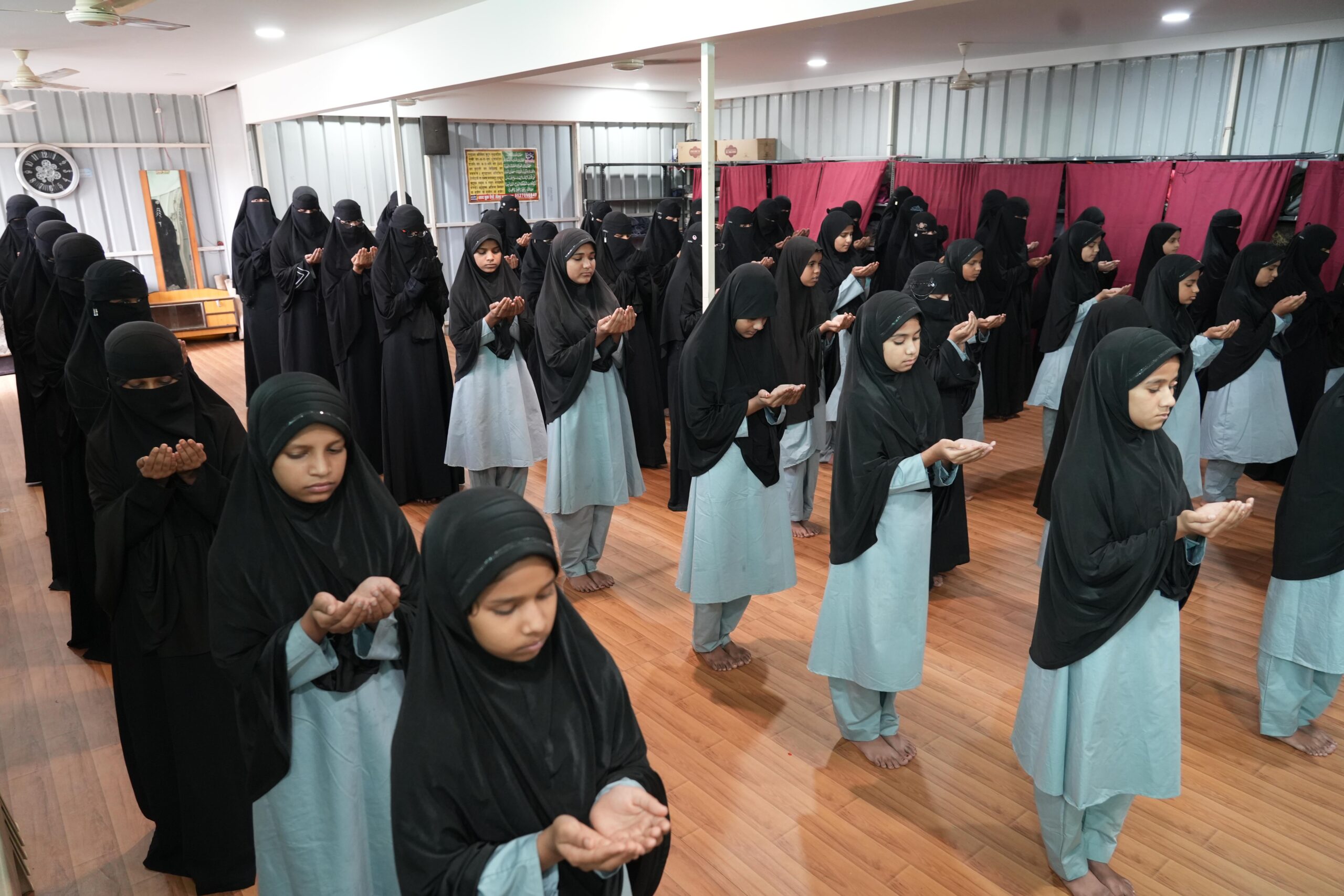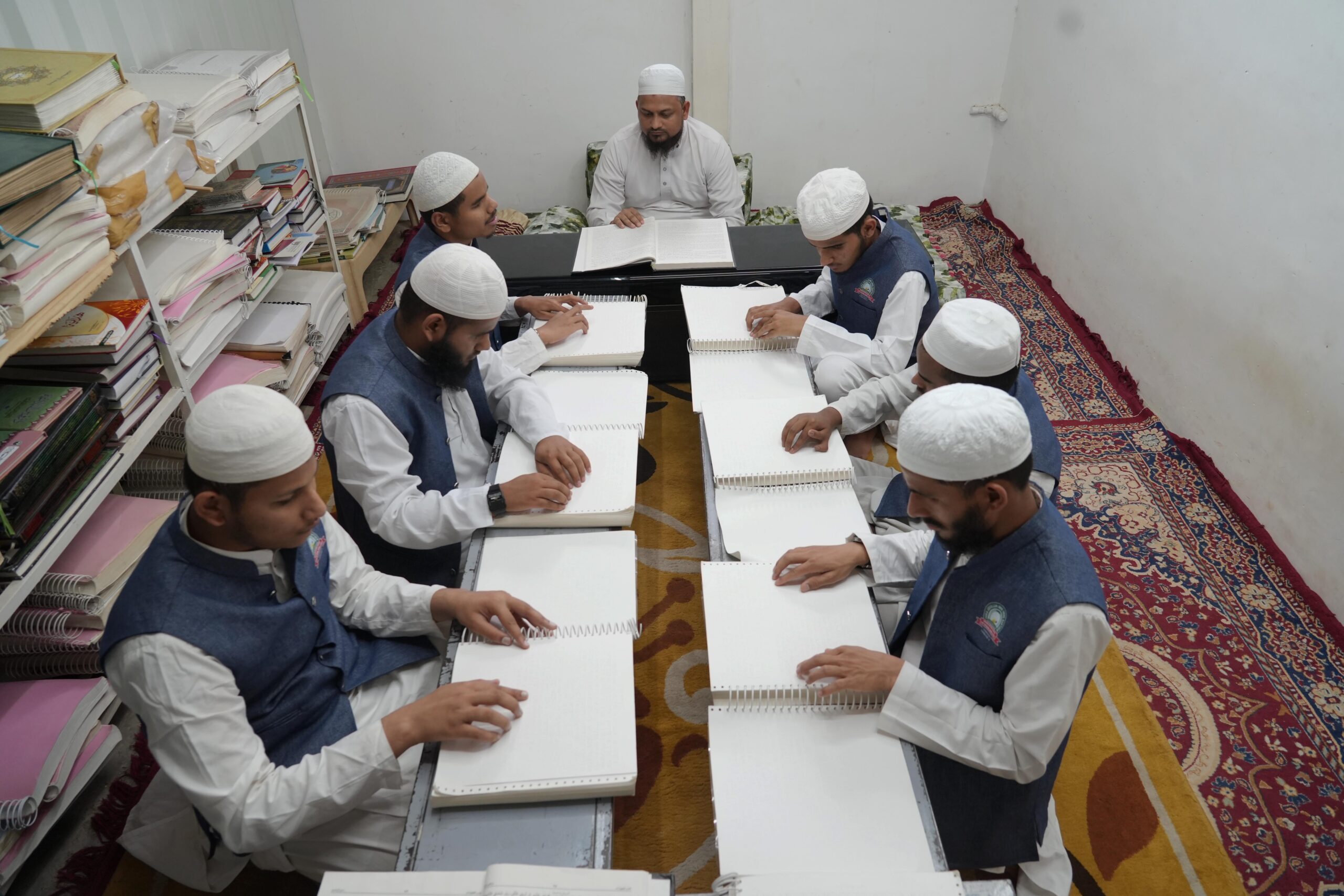A Madrasa Like No Other: Inside India’s First Inclusive Madrasa for the Deaf, Mute and Blind

Suhail Bhat, TwoCircles.net
In Pune, Maharashtra, Jamia Abdullah Ibne Umme Maktoom offers free Islamic and contemporary education to mute, deaf, and blind children from across 17 states—proving that disability is no barrier to dignity, faith, or ambition.
Pune (Maharashtra): In a small park in Maharashtra's Pune, on a Thursday morning in May, a group of well-dressed uniformed students stood barefoot, wearing white skull caps. Many of them were mute or visually impaired. As the national anthem played in the background, the students stood in solemn attention, while others - mute and deaf - used sign language to express the lyrics. It turned the moment into a display of patriotism and unity.
This is the usual beginning of the day at Jamia Abdullah Ibne Umme Maktoom (a religious seminary in Pune), where hundreds of mute, deaf and blind students receive free Islamic and contemporary education.
“It took us years to convince families of the importance of education for their special children,” says Nayeem Ahmad Qasmi, a secretary of the madrasa.
The institution was founded in 2013 with only two children with the vision to uplift differently abled children from across India through inclusive education.
According to the Census of 2011, approximately 2.2% of the population, around 26.8 million people, were identified as living with disabilities.
[caption id="attachment_452088" align="aligncenter" width="2560"] Female students at Jamia Abdullah Ibne Umme Maktoom in Pune, Maharashtra, offer prayers during school hours. The madrasa currently educates over 70 differently-abled girls - many of whom are mute, deaf or visually impaired - providing them with a safe and inclusive environment for both Islamic and contemporary learning.[/caption]
Female students at Jamia Abdullah Ibne Umme Maktoom in Pune, Maharashtra, offer prayers during school hours. The madrasa currently educates over 70 differently-abled girls - many of whom are mute, deaf or visually impaired - providing them with a safe and inclusive environment for both Islamic and contemporary learning.[/caption]
Unfortunately, many families abandon differently abled children or keep them confined at home - considering them a burden.
“It is the duty of every person to support differently abled children so they can prove their capabilities,” he adds.
Many students come from rural areas in different states, where families often do not know the value of education or the opportunities available to them.
"Before coming to Jamia, I did not know anything about Islamic and contemporary education," says 18-year-old Rehan Saleem from Jalgaon in Maharashtra.
Many students have received opportunities to present their skills on different platforms across India. Several have represented their school and secured positions in various sectors.
"By the grace of God, I have completed the Hifz-e-Quran (memorisation of the entire holy Quran) at this Jamia and got the opportunity to perform Umrah," says Rehan.
[caption id="attachment_452086" align="aligncenter" width="2560"] Students at Jamia Abdullah Ibne Umme Maktoom in Pune attend a classroom session where they receive both Islamic and contemporary education, guided by their teacher.[/caption]
Students at Jamia Abdullah Ibne Umme Maktoom in Pune attend a classroom session where they receive both Islamic and contemporary education, guided by their teacher.[/caption]
Today, the Jamia hosts 210 mute, deaf and blind students from 17 states across India. The seminary provides free education from Grade 1 to Grade 12, including subjects like science, computers, Islamic studies and advanced education.
Many students have gone on to study at various universities and colleges. For those unable to attend in person, the madrasa has launched an online education programme. Children here are provided with education, food, accommodation and even uniforms free of cost.
"Our mission is to see these children represent the country on every platform one day,” says Qasmi.
Despite the struggle, they have succeeded in building a thriving institution. In 2021, the madrasa launched separate sections for mute, blind and deaf women to ensure inclusive learning environments. Women’s education is just as important as men’s, and this initiative reflects that commitment.
Mubashira Sadiya Khan, who teaches specially abled
[caption id="attachment_452087" align="aligncenter" width="2560"] A young visually impaired student sits attentively in class, beside a Braille slate and stylus used for writing. At Jamia Abdullah Ibne Umme Maktoom, visually impaired children are given tools and support to receive religious and formal education in an inclusive environment.[/caption]
A young visually impaired student sits attentively in class, beside a Braille slate and stylus used for writing. At Jamia Abdullah Ibne Umme Maktoom, visually impaired children are given tools and support to receive religious and formal education in an inclusive environment.[/caption]
girls at the madrasa, says, "Women’s education is equally important as male education. These girls are usually occupied with household work at their homes, but we are giving them better education and showing them the purpose of life."
Since safety is a major concern for women in the country, the madrasa has provided separate rooms for them, with all female helpers to ensure a secure learning environment.
Mubashira adds, "Usually, women are not safe in the country, but here we have created a safe space where they can learn and grow with confidence."
Despite progress in education, children with disabilities in India often remain invisible - excluded from schools, denied opportunities and treated as burdens. Many end up begging or isolated at home, not by choice, but because society offers them no alternatives.
“We often see them begging on the roads, not because they want to, but because the society has failed to give them a chance,” says Qasmi.
[caption id="attachment_452085" align="aligncenter" width="2560"] Students in uniform attend class at Jamia Abdullah Ibne Umme Maktoom in Pune, where multiple sessions are held simultaneously in a shared hall to support inclusive learning.[/caption]
Students in uniform attend class at Jamia Abdullah Ibne Umme Maktoom in Pune, where multiple sessions are held simultaneously in a shared hall to support inclusive learning.[/caption]
The Jamia has been working to ensure that students with disabilities receive quality education, access to proper infrastructure and opportunities to engage in play and creative activities on campus. Its vision is to provide them with equal opportunities so they can compete and thrive like any other student.
“Our goal was simple - give them dignity, knowledge and a future,” Qasmi explains.
The Jamia is already offering digital learning tools, smart boards and inclusive facilities to ensure that the students receive a modern and accessible education. The institution continues to innovate and expand its reach through technology and tailored teaching methods.
“We have introduced smart boards, digital tools and inclusive classrooms because every child no matter their ability deserves access to quality, modern education,” says Qasmi.
In the current political climate in India, the Muslim community has often been portrayed in a negative light, and madrasa education is frequently misunderstood or dismissed. Despite these challenges, Jamia Abdullah Ibne Umme Maktoom continues to provide quality Islamic and contemporary education to differently-abled children, aiming to empower them with knowledge and confidence.
